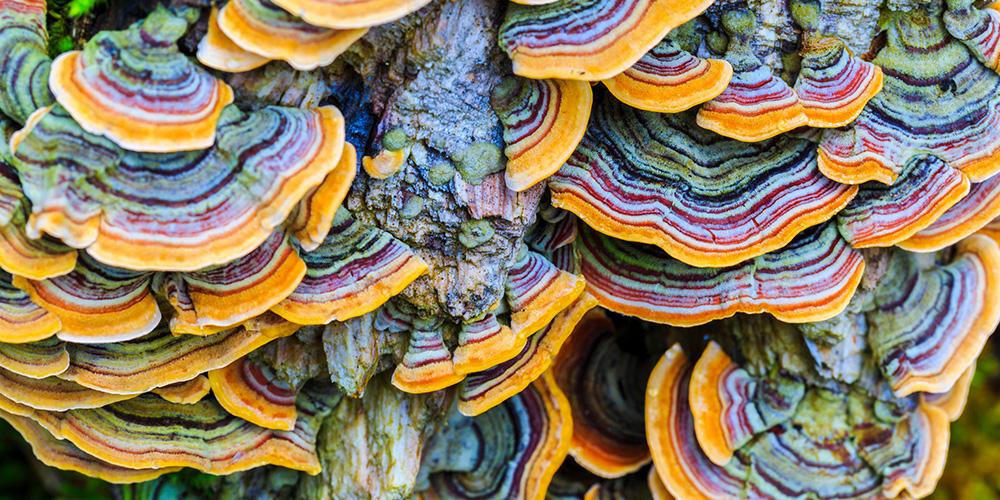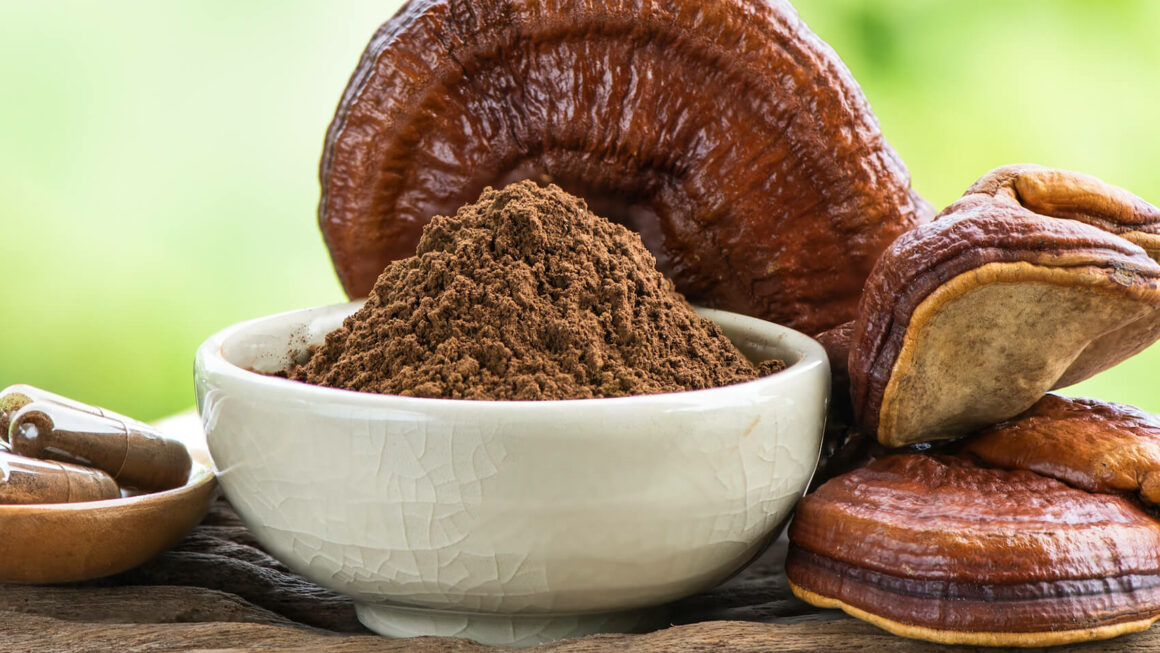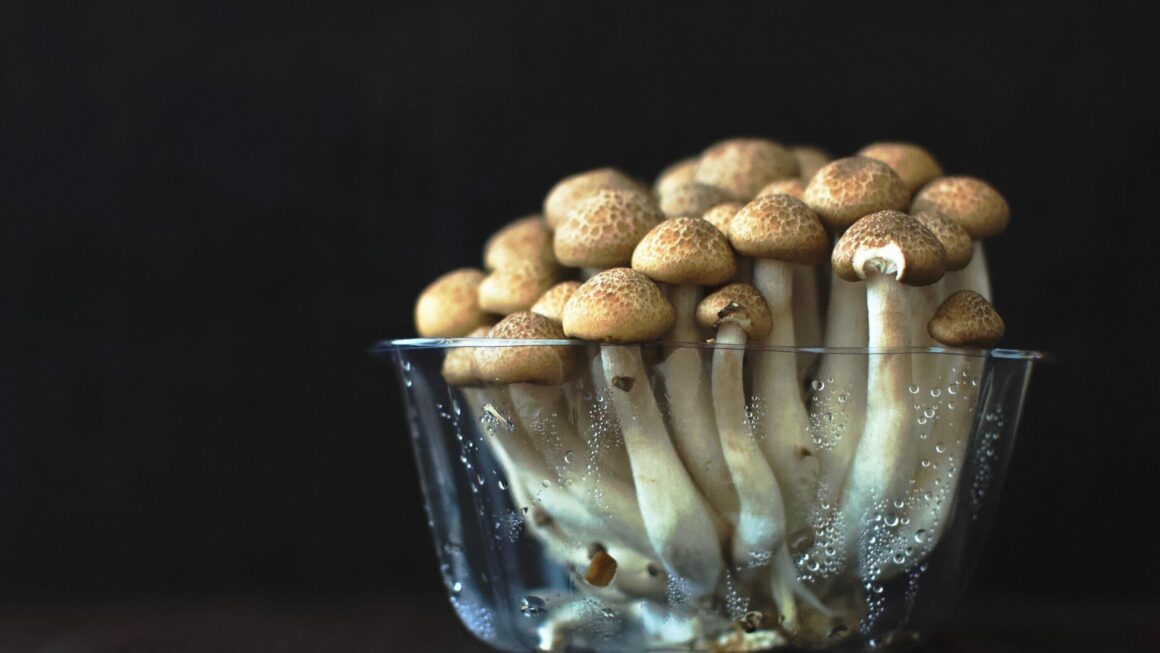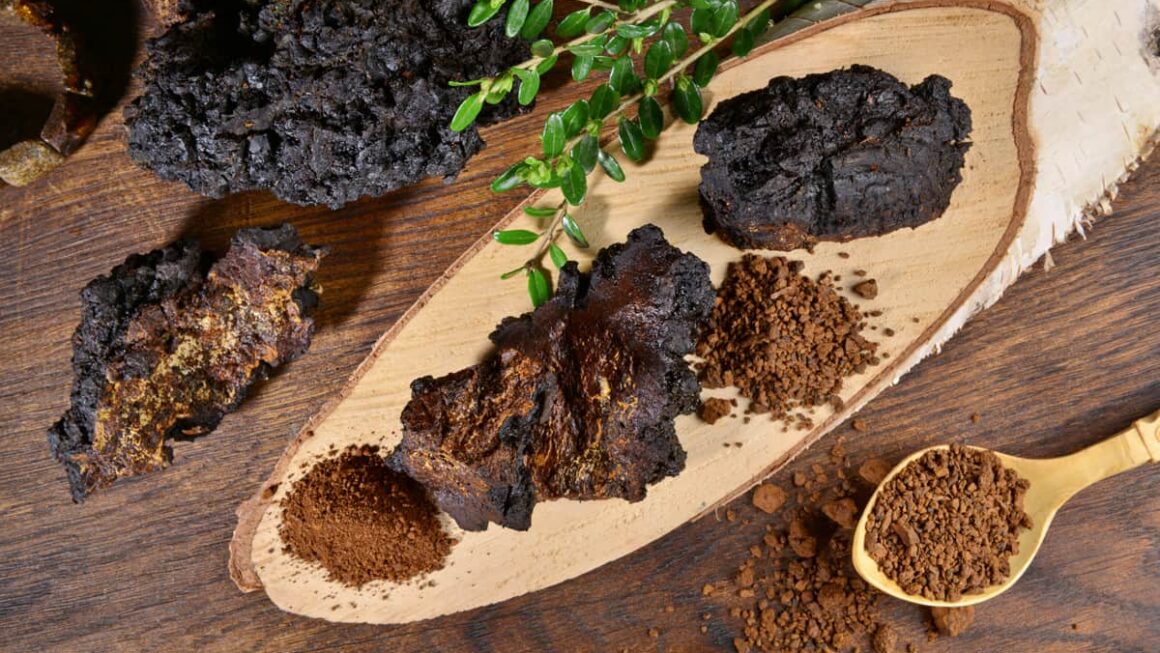Introduction
In the expansive world of functional mushrooms, Turkey Tail (Trametes versicolor) emerges as a distinctive and valued species, celebrated for both its vibrant appearance and potential health-promoting properties. Also known as Yunzhi or Coriolus versicolor, Turkey Tail has deep roots in traditional medicine, particularly in East Asia, where it has been cherished for centuries. As we embark on this comprehensive guide, we will delve into the historical context, the bioactive compounds within Turkey Tail, and the diverse range of benefits it may offer for immune support, gut health, and overall well-being.
Historical Roots and Cultural Significance
Turkey Tail mushrooms have a rich history deeply intertwined with traditional Chinese and Japanese medicine. Known as “cloud mushrooms” in China and “cloud ears” in Japan, they have been used for centuries to support vitality and well-being. Beyond medicinal use, Turkey Tail holds cultural significance, symbolizing longevity and good fortune. The historical reverence for Turkey Tail has paved the way for contemporary scientific exploration of its potential health benefits.
Bioactive Compounds in Turkey Tail
The health-promoting properties of Turkey Tail are attributed to its diverse composition of bioactive compounds, including:
- Polysaccharopeptides (PSPs): Unique to Turkey Tail, PSPs have been studied for their immune-modulating effects, contributing to the regulation of immune responses.
- Beta-Glucans: Like many medicinal mushrooms, Turkey Tail contains beta-glucans, polysaccharides known for their immune-enhancing properties. Beta-glucans play a pivotal role in supporting the immune system’s defense mechanisms.
- Trametes-Derived Proteins: Certain proteins derived from Turkey Tail, such as lectins and agglutinins, may contribute to its immunomodulatory effects.
- Phenolic Compounds: Turkey Tail is rich in phenolic compounds, including flavonoids and phenolic acids, which possess antioxidant properties. These compounds help neutralize free radicals and combat oxidative stress.
Immune System Support
One of the primary and well-researched benefits of Turkey Tail mushrooms is their ability to support the immune system. The bioactive compounds, particularly PSPs and beta-glucans, play a crucial role in modulating immune responses. By enhancing the activity of immune cells, Turkey Tail contributes to a robust defense against infections and illnesses. Regular consumption may fortify the immune system, promoting resilience and overall health.
Antioxidant Protection
Turkey Tail’s rich content of phenolic compounds equips it with potent antioxidant properties. Antioxidants play a pivotal role in neutralizing free radicals, unstable molecules that can cause cellular damage. By mitigating oxidative stress, Turkey Tail contributes to cellular health and may have implications for longevity and disease prevention.
Gut Health and Digestive Support
Emerging research suggests that Turkey Tail may play a role in supporting gut health and digestive function. Some potential benefits include:
- Prebiotic Effects: Certain compounds in Turkey Tail may act as prebiotics, promoting the growth and activity of beneficial gut bacteria. This prebiotic influence contributes to a balanced and diverse gut microbiota.
- Modulation of Gut Immunity: The interaction between Turkey Tail and the gut immune system is an area of interest. By influencing immune responses in the gut, Turkey Tail may contribute to a healthy and responsive digestive system.
Cancer Support and Adjunct Therapy
While more research is needed, some studies suggest that Turkey Tail mushrooms may have potential benefits in cancer support, particularly as adjunct therapy. The immunomodulatory effects, coupled with potential antitumor activity, make Turkey Tail a subject of interest in cancer research. It’s important to note that Turkey Tail should not be considered a standalone treatment for cancer, and individuals should consult with healthcare professionals for personalized guidance.
Respiratory Health
Turkey Tail’s immune-modulating properties extend to respiratory health. Research indicates that Turkey Tail may have benefits for conditions such as respiratory infections and allergies. By supporting the immune response in the respiratory system, Turkey Tail contributes to overall respiratory well-being.
Liver Support and Detoxification
The liver plays a crucial role in detoxification, and Turkey Tail has been studied for its potential liver-supportive effects. Preliminary research suggests that Turkey Tail may help protect the liver from damage and enhance its detoxification functions. This makes Turkey Tail a subject of interest for individuals concerned about liver health or those with liver conditions.
Cardiovascular Health
While research in this area is still in its early stages, some studies suggest that Turkey Tail may have cardiovascular benefits:
- Cholesterol Regulation: Early findings indicate that Turkey Tail may help regulate cholesterol levels, contributing to cardiovascular health by managing lipid profiles.
- Anti-Inflammatory Effects: Turkey Tail’s anti-inflammatory properties may have implications for cardiovascular health, as chronic inflammation is a contributing factor to heart disease.
Mental Well-Being and Cognitive Health
The potential impact of Turkey Tail on mental well-being and cognitive health is an area of ongoing exploration
- Neuroprotective Effects: Some studies suggest that the bioactive compounds in Turkey Tail may have neuroprotective effects, potentially contributing to cognitive function and protecting against neurodegenerative conditions.
- Stress Reduction: The immunomodulatory properties of Turkey Tail may extend to stress reduction, as a balanced immune system is closely linked to overall stress resilience.
Antiviral Properties
Research on Turkey Tail’s antiviral properties is evolving, with some studies indicating potential benefits against certain viruses. While it’s essential to interpret these findings cautiously, Turkey Tail’s immune-modulating effects make it a subject of interest in antiviral research.
How to Incorporate Turkey Tail into Your Routine
Turkey Tail is available in various forms, allowing for flexibility in how it can be incorporated into daily routines. Common forms include:
- Supplements: Turkey Tail supplements, available in capsule or powder form, offer a convenient and standardized way to integrate this functional mushroom into your routine.
- Tea: Turkey Tail tea can be made by steeping dried Turkey Tail pieces or powder in hot water. This method provides a soothing and earthy beverage.
- Tinctures: Turkey Tail tinctures, typically alcohol extracts, offer a concentrated and easily absorbed form of Turkey Tail. A few drops can be added to beverages or taken directly.
- Culinary Use: Turkey Tail has a mild flavor, making it suitable for culinary use. It can be added to soups, stews, or other dishes, providing a nutritious and flavorful element.
Considerations and Precautions
While Turkey Tail is generally considered safe for most individuals, it’s essential to be mindful of certain considerations:
- Allergies: Individuals with allergies to mushrooms should exercise caution and, if necessary, consult with a healthcare professional before incorporating Turkey Tail.
- Potential Interactions: Turkey Tail may interact with certain medications, particularly immunosuppressants. Consult with a healthcare provider, especially if you are taking medications that affect the immune system.
- Quality and Purity: When choosing Turkey Tail supplements, ensure they come from reputable sources to guarantee quality and purity. The quality of the supplement can impact its efficacy and safety.
Conclusion: Unveiling the Healthful Tapestry of Turkey Tail Mushrooms:
In the exploration of functional mushrooms, Turkey Tail emerges as a vibrant and healthful contributor to holistic well-being. Its historical significance, coupled with contemporary scientific interest, positions Turkey Tail as a versatile ally in the pursuit of vitality. From immune support and gut health to potential benefits in cancer support and cardiovascular well-being, Turkey Tail offers a rich tapestry of advantages.
As you consider integrating Turkey Tail into your routine, whether through supplements, teas, or culinary creations, approach it with an informed perspective. Recognize that the benefits of Turkey Tail extend beyond immune support, encompassing various facets of physical health and mental well-being. Consult with a healthcare professional to ensure that Turkey Tail aligns with your health goals and complements your overall wellness journey.
In embracing Turkey Tail, you embark on a journey to harness the healthful bounty of nature, drawing upon centuries of traditional wisdom and contemporary insights. The colorful spectrum of Turkey Tail mushrooms invites you to explore the intricacies of immune resilience, digestive vitality, and the interconnected pathways that contribute to a thriving and balanced life.




